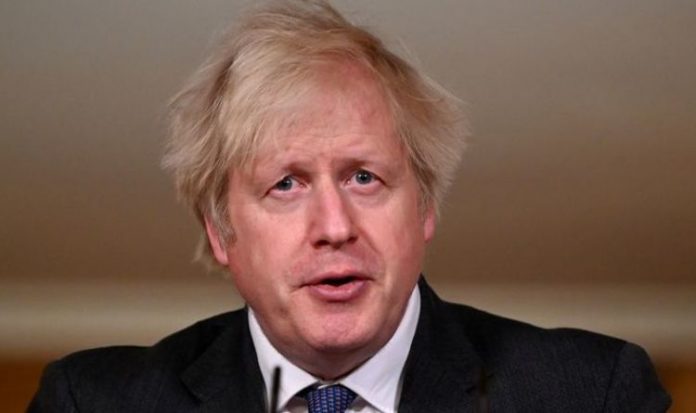Boris Johnson’s roadmap for easing lockdown restrictions in England is expected to be finalised over the weekend. New data from the Oxford and Pfizer vaccines has suggested that jabs could cut transmission of the coronavirus.
The crucial data could help Mr Johnson’s path out of lockdown.
The early “real world” results show that one dose of the Pfizer and Oxford vaccines have a consistent effect on transmission among adults.
Professor Thomas House, from the University of Manchester and modeller for the Government’s scientific advisory group SAGE, spoke to BBC Newsnight on Friday about lifting Covid restrictions.
Newsnight host Faisal Islam asked Dr House: “Last time, maybe 10 months ago, the suggestion was that we had to protect the capacity of the NHS to deal with this. The goal posts have shifted here haven’t they? This is a stronger standard you are trying to meet in order to lift the restrictions?”
Dr House responded: “The problem is when something is this infectious we can lose control and end up making decisions that may be very very much worse from every point of view because our hands have been forced.
“Whereas if we can be careful I think everyone hopes that we can really see a roadmap back to normal that’s going to drive an appropriate balance.”
But Dr House warned there “is no easy answer” to the appropriate way in which to ease restrictions.
He added: “I think it’s unfortunate to claim that it’s easy in either direction.
READ MORE: Brexit boost: Boris secures crucial data sharing pathway from bloc
The R value is a way of rating the coronavirus’ ability to spread.
R is the average number of people that one infected person will pass the virus on to.
The Government has been aiming to decrease the R number below 1 as it indicates the disease will eventually stop spreading.
However, Dr House explained how lockdown measures have allowed the infection rate to decrease rather than pharmaceutical interventions.
He said: “What I think people need to understand is that this disease is very infectious.
“The R rate now is close to 1 primarily because of the non-pharmaceutical interventions.
“We believe that if people returned to their behaviour of about a year ago, there is insufficient immunity either due to natural infections or vaccination to control spread so we have to think carefully about that.”
But Dr House did stress the importance of other “real” details to understand when restrictions can be lifted.
He said: “It is important to stress it is never the case that those numbers on their own determine what we need to do because we also need to know what’s going on … these difficult trade-offs.
“What’s going on in the communities, the real details as well as that big picture of just how infectious this is and how much immunity there needs to be before normal behaviour will not lead to increased spread.”







